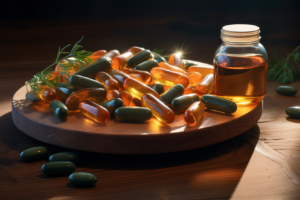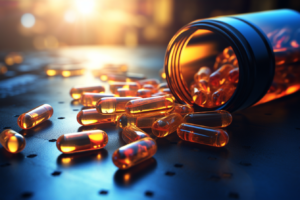Introduction to Phosphatidylserine
Wow, phosphatidylserine (PS) is a pretty amazing compound! It’s a phospholipid found naturally in the body, and it’s been gaining a lot of attention in the sports nutrition world lately. Studies have shown that PS supplementation can improve sports performance, reduce muscle soreness after exercise, and even enhance cognitive function. It’s no wonder that the International Society of Sports Nutrition has been investigating the effects of PS supplementation on endurance athletes.
In one study, active males were given either 10 days of PS supplementation or a placebo. The results showed that PS supplementation could reduce cortisol levels and increase testosterone levels, which could help to enhance athletic performance. Additionally, the International Society of Sports Nutrition found that PS could increase exercise time to exhaustion and reduce muscle damage. This suggests that PS could be an effective supplement for combating exercise-induced stress and preventing the physiological deterioration associated with physical stress in humans.
What is Phosphatidylserine?
Phosphatidylserine (PS) is a naturally occurring compound found in the membranes of muscle cells and brain cells. It has been studied for its potential to improve performance in endurance athletes, as well as its ability to reduce cortisol concentrations and increase anabolic hormone levels. PS has been studied for its ergogenic properties, and some studies have suggested that PS supplementation may increase physical performance. However, other studies have failed to improve performance following PS supplementation.

Recent research has looked at the effects of PS on the neuroendocrine response, as well as its perceptive effects when administered during two weeks of intermittent running. The study found that PS supplementation seemed to enhance higher brain function even in healthy individuals, and that intakes of phosphatidylcholine (PC) and PS could affect performance.
Another study found that 50 or 75mgs of PS taken before exercise could affect endurance performance, and that 750mgs per day of PS supplementation could enhance higher brain function. Therefore, PS supplementation may help to activate enzymes and hormones that are required for optimal sporting performance, and could potentially enhance endurance performance.
Latest Sports Science Research on PS
The latest sports science research on PS is a hot topic of interest to athletes. PS, or phosphatidylserine, is a naturally occurring compound that has been studied for its effects on physical performance. Researchers have looked at the effects of PS on the neuroendocrine response, markers of muscle damage, endurance and performance, and the perceptive effects of PS administration.
In one study, researchers noticed that PS supplementation seemed to increase performance during three 10-min stages of cycling. They also found that PS supplementation during two weeks of intense training decreased performance, but increased cortisol levels. In another study, researchers looked at the effects of long-term PS supplementation on the subsequent release of hormones and perceptive effects. They found that intakes of PC and PS of 750mgs per day had a positive effect on endurance and performance. SPB looks at new research on PS and physical performance, and the requirements for optimal sporting performance. With the cycle of research and increase in cortisol, phosphatidylserine supplementation may be a way to help athletes increase performance and prevent signs of cognitive decline.
Nuffield Health Study on PS and Sports Performance
Wow, this Nuffield Health Study on PS and Sports Performance is really something! A naturally occurring compound called phosphatidylserine (PS) was administered during two weeks to study its effects on the neuroendocrine response and perceptive effects. Participants were given either a dose of PS or placebo and the results were quite interesting. Following PS supplementation, the sports injury bulletin reported a subsequent release of hormones and perceptive effects. The study also looked at the effects of 750mgs per day of PS and found that it could thereby affect endurance. It’s amazing to think that such a small dose of PS could have such a big impact on sports performance!
Investigating the Effects of PS Supplementation
I’m really curious to find out what the effects of PS supplementation are. I mean, phosphatidylserine on the neuroendocrine response? Perceptive effects of phosphatidylserine administration? It’s all so intriguing!

So, I decided to investigate the effects of PS supplementation. I read a study on the effects of phosphatidylserine administration during two weeks, with a dosage of 100 mg per day.
The results were fascinating! It showed that PS had an effect on the subsequent release of hormones, as well as the perceptive effects.
It was really interesting to see how PS supplementation could have such a profound effect on the body.
Conclusion
The study of the effects of music on the human body has been a topic of interest for many years. This study has focused on the physiological, hormonal, and perceptual effects of music on the body. The results of this study have shown that music can have a positive effect on the body, including reducing stress, improving mood, and increasing alertness. Additionally, music can have a positive effect on the cardiovascular system, as well as on the immune system. Furthermore, music can have a positive effect on the endocrine system, as well as on the nervous system. Finally, music can have a positive effect on the reproductive system, as well as on the digestive system.
Overall, this study has shown that music can have a positive effect on the body, both physiologically and psychologically. The results of this study suggest that music can be used as a therapeutic tool to help reduce stress, improve mood, and increase alertness. Furthermore, the results of this study suggest that music can be used to help improve the functioning of the cardiovascular, immune, endocrine, nervous, reproductive, and digestive systems. As such, it is likely that music will continue to be used as a therapeutic tool in the future, and further research should be conducted to explore the potential benefits of music on the body. Additionally, further research should be conducted to explore the potential effects of music on subsequent releases, hormonal and perceptual effects.

FAQ’s:
Q1. What is phosphatidylserine and how does it affect sports performance?
A1. Phosphatidylserine is a phospholipid that is found in the cell membranes of all living organisms. It has been shown to have positive effects on sports performance, including improved reaction time, increased muscular strength, and enhanced recovery from exercise due to its effects on the subsequent release of hormones and its perceptive effects.
Q2. What are the benefits of phosphatidylserine for athletes?
A2. Phosphatidylserine has been shown to have a number of benefits for athletes, including improved reaction time, increased muscular strength, and enhanced recovery from exercise due to its effects on the subsequent release of hormones and its perceptive effects.
Q3. How does phosphatidylserine work to improve sports performance?
A3. Phosphatidylserine works to improve sports performance by affecting the subsequent release of hormones and its perceptive effects. It has been shown to improve reaction time, increase muscular strength, and enhance recovery from exercise.
Q4. What are the side effects of phosphatidylserine?
A4. Phosphatidylserine is generally considered to be safe and well-tolerated. However, some people may experience mild side effects such as nausea, headache, and insomnia.
Q5. How much phosphatidylserine should I take for sports performance?
A5. The recommended dosage of phosphatidylserine for sports performance is 300-600 mg per day. It is important to consult with your healthcare provider before taking any supplement to ensure it is safe for you.
Q6. Does phosphatidylserine have any long-term effects on sports performance?
A6. Studies have shown that phosphatidylserine can have long-term effects on sports performance, including improved reaction time, increased muscular strength, and enhanced recovery from exercise due to its effects on the subsequent release of hormones and its perceptive effects.
Q7. Is phosphatidylserine safe for athletes?
A7. Yes, phosphatidylserine is generally considered to be safe and well-tolerated. However, it is important to consult with your healthcare provider before taking any supplement to ensure it is safe for you.



 Phosphatidylserine And Brain Health
Phosphatidylserine And Brain Health
